HOME | ABOUT US | MEDIA KIT | CONTACT US | INQUIRE
HOME | ABOUT US | MEDIA KIT | CONTACT US | INQUIRE
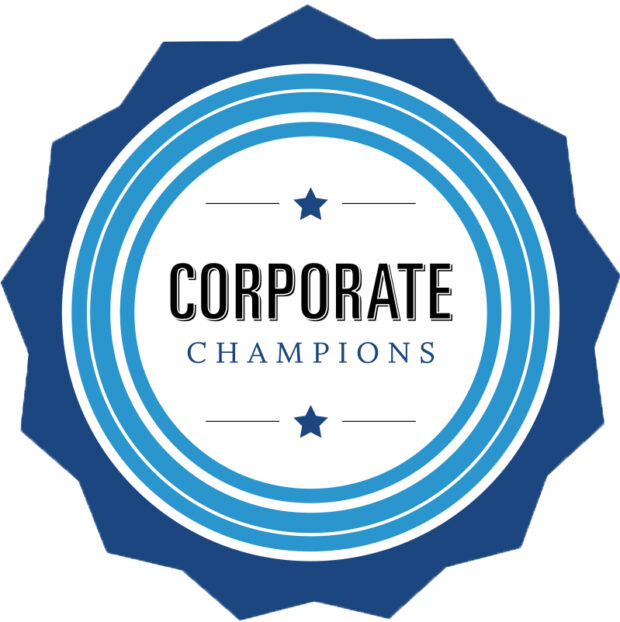
Nominate a 2020 Corporate Champion!
Kansas City has long enjoyed the warm glow of praise for being one of America’s most philanthropic communities. That continues to be the case with the most recent metro market study by Charity Navigator, which still shows us with a Top 10 finish. But the No. 9 ranking is a bit lower than many might have thought—there have been plenty of local claims to being the most philanthropic city in the U.S.—and the metrics behind the organizations calculation are detailed and sophisticated.
Taken at face value, it should be at once a source of pride for the business community that helps drive much of the non-profit success here—and a bit of a challenge to meet the standards being set in places like No. 1 San Diego and No. 2 Houston. And (tip of the hat for our neighbors) No. 3 St. Louis.
The bright side? This community is teeming with companies that step up to the challenge. Whether that need means backing for social services, sup-
port for visual and performing arts, dollars for education, housing or health care, the for-profit world helps meet it. Companies do this with direct cash contributions, with in-kind contribution of services—everything from construction materials and labor to advertising, pro bono legal work and un-compensated medical care—with board service, with volunteer hours and with paid time off so staff members can sup-port the causes that they hold most dear.
That level of response says a lot about the six companies recognized this year—and about the nearly 60 others recognized as Corporate Champions since this feature debuted in 2008. Welcome, then, the 2019 Corporate Champions to that mix, and join us in thanking them for the service that helps make Kansas City the ideal place to work, play and operate a business.
We’re all better off for their contributions, and their example.
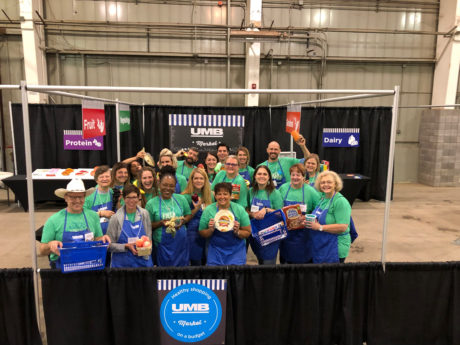
Volunteers at the UMB Market booth during the American Royal, teaching children about nutritional and fiscal grocery shopping practices.
UMB BANK
UMB Bank has a wide reach in the Kansas City area, being the largest locally headquartered financial institution, and its giving spans just as far. Here, and in the six other states it does business, UMB associates have volunteered with more than 675 non-profits, representing in excess of 25,000 hours of community service.
The company also matches financial contributions from associates to organizations and encourages employees to volunteer their time. Management offers employees two additional paid days off a year to spend volunteering.
“Our associates are proud of where they live and work, and we encourage them to contribute to our communities’ vibrancy and success,” says Jim Rine, president and CEO. “As a company, we want to live by that same standard. That is why we encourage our associates to serve on non-profit and civic committees and boards, and UMB donates to and sponsors organizations throughout our multi-state footprint.”
To put a dollar value on it, the time UMB associates spent in the field equates to $556,000 in wages. Volunteering is especially important for UMB’s younger associates because it “has proven to be an excellent way to grow personally and professionally by gaining leadership experience, honing technical competencies and building their network,” Rine says. It can also attract employees, especially those in the sought-after Millennial generation. They currently make up about 38 percent of UMB’s work force, Rine says, and are attracted to the company because of its dedication to community service.
“Our Millennial work force consistently cites UMB’s reputation of community involvement and volunteerism benefits as reasons that make them proud to be associated with our company,” he said. One initiative UMB has been a strong supporter of is the School of Economics, a facility in Blue Springs that hosts field trips from local schools to teach kids about basic marketplace concepts and skills. The program, which has been around for 25 years, also gives students an insight into business-related careers. Due to major demand, earlier this year, a second school was opened Downtown, in a UMB office building, geared toward kids in the urban core. It is expected to educate 20,000 children during the current school year.
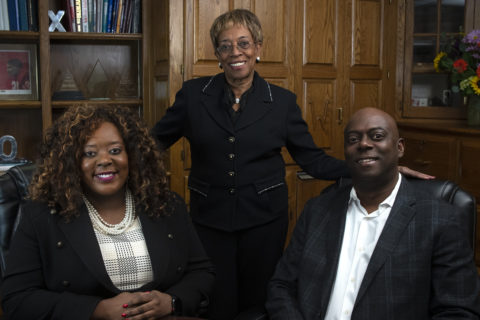
From left: CFO Tiffany Woodley, CEO Robery Woodley and COO Terry Woodley.
WOODLEY BUILDING MAINTENANCE
Woodley Building Maintenance uses the phrase “The Woodley Way” to describe its one-stop shop for building maintenance and janitorial services, as well as the perfection its team aims to achieve. The 50-year-old firm’s management team also applies the term to the way it approaches its non-profit service work.
The list of organizations WBM serves through financial support, volunteerism, and/or board membership is long. What they all have in common is a mission to focus on the welfare and betterment of the urban core, education, health awareness and providing food and shelter for the less fortunate.
“Many of the people in our work force live, work and have children in schools within the urban core,” says Terry Woodley, the company’s chief operating officer. “We have seen the struggles that they face in everyday life and it compels us to either donate or provide our team with an opportunity to serve in a volunteer capacity.”
His late father, Jimmy Woodley, founded the company in 1969. Terry Woodley says his father “had a passion for helping young people. Having lost his parents at a young age, Jimmy sought education and job opportunities that helped give him the principles and foundation for starting a business himself.” Due in part to that, WBM has tried to pay its success forward with assistance to organizations that include, Saint Luke’s Health System, the American Diabetes Association, Kansas City Hospice Care, Mid-Continent Council of Girl Scouts, Rose Brooks Center, Genesis School, Heart to Heart International, Sheffield Place, Wounded Warrior Project, Hope House and the Salvation Army. One of the region’s largest commercial janitorial companies, WBM has more than 700 employees serving nearly 800 customers across a wide range of industries. It’s one-stop shop, part of the “Woodley Way,” offers services that include interior building maintenance; exterior work, such as pest control and window washing; and customized janitorial supplies for clients’ needs.
That philosophy, Terry says, “also refers to the ways in which we strive to positively impact the Kansas City community: “Part of the ‘Woodley Way’ encompasses our desire to positively impact that community that has given us so much.”
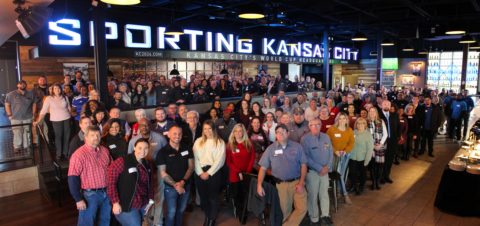
The Block team, gathered for their 2019 holiday celebration.
BLOCK REAL ESTATE SERVICES
Even though Block Real Estate Services is busy with some of the biggest commercial real estate deals in the area— managing more than 43 million square feet and nearly 7,400 multifamily units—the company still finds time to give back.
“We have a unique vantage point as we collaborate with civic, business and community leaders in our day to day business,” said Managing Principal Ken Block, who supports a long list of area service organizations. “The collaboration needed to accomplish our projects is the same collaboration necessary to identify community challenges and assemble the resources required to address these challenges. It also brings awareness to our employees about the many organizations and individuals in the Kansas City community that serve others. Through these interactions, we are provided the opportunity to serve our community and assist organizations in their missions.”
BRES gives funding and time to organizations that focus on education, health and human services, as well as non-profits that its employees, clients and others with who they do business are actively engaged. “Many of our employees’ families have been touched by illness, disease or other issues and it is important to us, as their work family, to strongly support all of these causes or organizations,” Block said.
The firm recently partnered with the ReNew KC Foundation, which will renovate, restore, and renew blighted neighborhoods and work to relieve the housing crisis for the homeless, veterans, the poor and elderly. The company is also a longtime supporter of the Allen J. Block Outpatient Palliative Care Program at the University of Kansas Cancer Center.
“We have long felt it is an honor and a privilege to do business in Kansas City,” Block said. “The quality of life, the level the health care, the spirit of the community and its philanthropy—we don’t take any of it for granted. We are grateful, and with that gratitude comes a responsibility to ensure our community continues to thrive and takes care of its own. We lead by example and hope to spur the involvement of others to make our community better.”
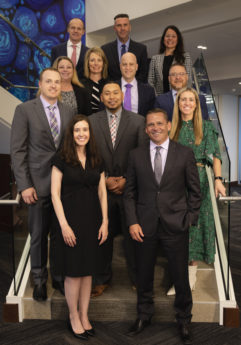
Front row, (l-r): Anne Dorian, Senior Vice President, Regulatory Compliance; Marty Bicknell, CEO & President. Second row, (l-r): Chris Cook, Senior Vice President, Information Technology; Kenny Pointer, Senior Vice President, Operations; Cheryl Bicknell, Chief Operating Officer & Chief Strategy Officer. Third row, (l-r): Christa Spencer, Senior Vice President, Marketing and Communications; Kara Stoecklein, Senior Vice President, Human Resources; Brian Leitner, Chief Practice Management Officer and Head of Wealth Management; George Fernandez, Vice President, Practice Management. Back row, (l-r): Jeff Poe, Chief Financial Officer; Brian O’Regan, Head of Corporate Development; Katrina Scott, Chief Investment Officer.
MARINER WEALTH ADVISORS
As a company, Mariner Wealth Advisors’ directive is to maintain and grow its clients’ wealth. Its success in doing so affords the firm, with $22 billion in assets under management, the opportunity to serve metro residents on the other end of the spectrum, those who are in need.
The Overland Park-based company serves underprivileged communities through the employee-created Mariner Foundation. Employees and the company have pledged $1.3 million this year. When an associate makes a pledge to the foundation, the firm matches it dollar for dollar. The company, with offices across the country, makes it easy too; deductions to the foundation can be made directly from employee paychecks.
“Giving back is embedded in our culture, so it came naturally to start our own internal foundation to support our communities,” says Marty Bicknell, president and chief executive officer of Mariner Wealth. In addition, the firm holds an annual giving campaign. Since its founding in 1995, Mariner Wealth has given more than $5 million to a host of charitable organizations.
“The beauty of having an employee-run foundation is that our associates are really the ones that help drive where the support goes,” Bicknell explains. “Our mission is pretty broad, but we have a primary focus on supporting underprivileged children and their families.” Mariner also gives employees 16 hours of community service time per year to volunteer on projects and with community organizations. Many of Mariner’s clients are also involved with non-profits and suggest additional groups that might need assistance. “A lot of our clients are involved in organizations, and that involvement is sometimes how our associates learn about some of these great causes that might be a good fit for us to support,” Bicknell said.
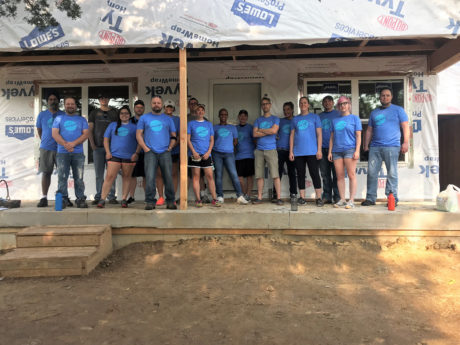
Answering the call from Habitat for Humanity, DEG workers
turned out to help construct a home for an area family in need.
DEG
DEG, Linked by Isobar, just recently created its own foundation, but Co-founder and CEO Neal Sharma, says the company’s dedication to philanthropy was part of its DNA when the digital-marketing agency was founded 20 years ago.
“Actively contributing to our community is written in our core values,” Sharma says. “We developed the foundation a few years ago to better channel our many different philanthropic initiatives and to better coordinate across our growing firm.”
DEG’s foundation, with a focus on the Kansas City area, contributes to various organizations, including The Salvation Army, American Red Cross, UNICEF, Make-A-Wish Foundation, Children’s Hospital Association and others. In addition, DEG has been a part of the University of Kansas Health System’s popular Treads and Threads event, held every year for the last 17 years at the Kansas Speedway.
“Our associates are also encouraged to pursue opportunities to give back to organizations important to them, and the DEG Foundation helps to support and match those when possible,” Sharma says. “A few of those causes include cancer research and treatment, childhood development and education, and business and entrepreneurial expansion. We chose these causes because they continue to be particularly close to the hearts of our founders and our associates.”
An interest in community involvement by companies, as well as transparency and trust, is increasingly displayed by both consumers and employees, says Sharma, pointing out that young-er generations have helped push those concerns higher on the agenda. “All generations have this impetus in their hearts and minds, but Millennials are unique in the priority that they assign to these virtues,” he says. “This has spawned a new way of looking at capitalism in general, and a strong belief that we ascribe to, that you can do good and do well at the same time.”
Following the acquisition last year by Japan’s Dentsu Aegis, DEG’s philanthropic reach has continued to grow. The firm has been in on the creation of the Isobar Good venture, which uses human-centered design and marketing strategies to help service organizations expand further.
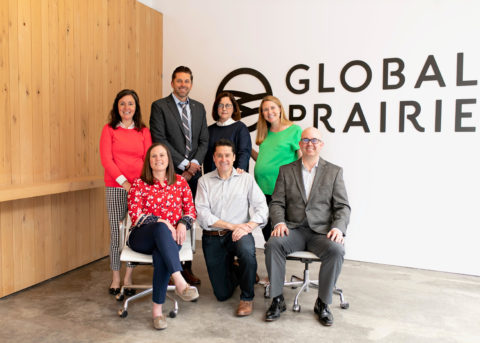
Seated, (l-r): Amie Hankel, Director, Team Engagement; Michael Kanaley, Managing Director, Operations; Matt Heimsoth, Managing Director, Finance. Back row, (l-r): Laura McCarthy, Director, Client Partnership; Mike Hauser, Managing Director, Creative & Technology; Anne St. Peter, Co-Founder; Lily Maxwell, Director, Client Partnership and Regional Director, Midwest.
GLOBAL PRAIRIE
It’s impossible to separate Global Prairie from philanthropy. The firm was founded in 2008 as a Benefit Corporation (B-Corp), meaning one of its major components is having a company mission that involves improving the communities where it does business.
To that end, Global Prairie employees are given 117 hours annually to perform community service. “We encourage every Global Prairie team member to be actively involved in the community with causes that they have a passion for,” said Anne St. Peter, company founder. “It is so important to us that our team is made up of engaged, empowered, community-minded philanthropists.”
One-third of Global Prairie’s employees serve on the board of directors of a nonprofit, and this year associates will have volunteered 10,000 hours in 10 cities around the world. Community service progress is also tied to employee evaluations.
“We believe we need to measure what matters and reward folks who do all they can to make a positive impact not only for our clients, but also for our culture, our community and the world around us,” St. Peter said.
The service-minded mission of Global Prairie can be seen in the work it has done for clients. It has worked with FEMA on engagement and risk communications regarding flooding dangers. With Google, it helped create the Digital Inclusion Fund, which involved researching local households to find those with underserved Internet access and help make it available to those residents.
And Global Prairie is sharing its service efforts with other companies so that they can implement similar programs.
“Global Prairie has been consulting with our clients to address ways they can leverage their own corporate purpose to not only generate profit, but also make a positive impact on the lives of their employees and the world around them,” St. Peter said.
“We have developed a robust consulting practice focused on the alignment of corporate purpose, profit and employee engagement and community impact. It also is a true joy to help our clients become certified Benefit Corporations, helping to spread the gospel of business as a force for good in the world!”